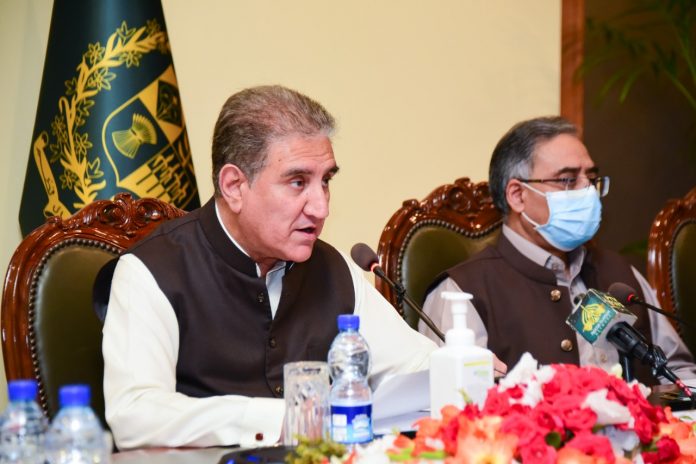ISLAMABAD, Foreign Minister Shah Mehmood Qureshi on Wednesday said the people of Tharparkar faced the severe problems of clean water, food shortage and stunted growth and called upon the Sindh government not to deprive the locals of their basic rights.
“I appeal to the authorities in Sindh not to neglect the people of Tharparkar and Umerkot, who have elected you to resolve their basic problems,” the foreign minister said at an event titled ‘Climate Smart Agriculture and Food Security’ here at the National Agriculture Research Center (NARC).
The conference was organized by Pakistan Agriculture Research Council (PARC), German non-governmental organization Welthungerhilfe (WHH) and Thardeep Rural Development Programme (TRDP) to highlight the importance of climate-smart agriculture for sustainable livelihoods and the food and nutrition secure communities.
Recalling his visit to Tharparkar and Umerkot during the election campaigns of 2013 and 2018, Qureshi said the locals thronged with their demand for clean water and complained about the diseases due to contaminated water.
“Unfortunately, in the last seven decades, the governments have not been able to provide them with clean water,” he said.
The foreign minister mentioned that Prime Minister Imran Khan listened to the grievances of the people of Tharparkar and announced a plan to provide them clean water.
However, he regretted that the Sindh government was creating hurdles in the progress of these projects.
Qureshi mentioned his historic ties with Umerkot and Tharparkar where his ancestor had visited to preach Islam and said that he was keen for development in the area.
Pakistan, once a water abundant country, he said, was affected by climate change and was facing shortage of the essential commodity.
He stressed the importance of climate smart agriculture and food security as vital for the country.
He thanked the German NGO and the German Embassy for raising awareness about the problems in Tharparkar, where the people suffered food shortage, high infant mortality rate and deaths due to snakebites.
In TharParkar, he mentioned that fifty percent of the Tharparkar population comprised Hindus, who were lawful citizens of the country.
“Therefore, we must ensure their safety and provide them basic facilities,” he added.
Pakistan is one of the countries most severely affected by climate change. Average temperatures have already risen by almost 0.37°C since 1980.
The Climate Risk Index places Pakistan in 5th place in terms of vulnerability to climate risk. The frequency of extreme climatic events is increasing, including droughts and floods with severe impact on climate-sensitive livelihoods.
The Global Hunger Index ranks Pakistan on 88th place indicating serious hunger levels. Thirty-seven percent of the population is estimated to be food insecure.
The short-term causes of malnutrition lie in extreme weather events and or socio-economic household conditions, long-term causes are more likely to be structural as well as challenges within the global, national, and local food systems also caused by climate change exacerbating the poor nutritional status of vulnerable populations
In Sindh, the effects of climate change are particularly visible through extreme weather events. The arid region of the Thar desert is affected by recurring and persistent drought in the last five years besides flood and locust infestation impacting agriculture production, livelihoods, and the ecosystem.
The PARC, WHH and TRDP are working in the Thar region to promote climate-smart agriculture and resilience towards food and nutrition security of smallholder farmers.
The joint project engages local communities, academia, agriculture extension departments and policy makers in the adaptation of climate-smart agriculture practices through direct support to most vulnerable communities.
Follow the PNI Facebook page for the latest news and updates.









